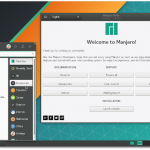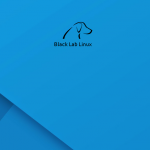Download latest Linux-based LibreELEC Krypton -- Kodi addons like Exodus and Covenant will work

The Kodi media center is facing a lot of scrutiny in the media lately. Some people feel that the negative coverage is "fake news." It is important to remember that Kodi is not illegal. With that said, it can be made so with piracy-related addons. Since Kodi is open source, even if the developers removed the ability to install addons, other people could easily fork the code to add it back. Pandora's box cannot be closed.
Many people that use Kodi do so with a dedicated Linux-based operating system, such as the excellent LibreELEC. You see, these distros exist only to run the open source media center, meaning there are no resources wasted on unnecessary things. Today, LibreELEC (Krypton) v8.1.2 BETA sees release. You can install it immediately, and don't worry -- your addons like Exodus and Covenant will work fine.
Korora 26 'Bloat' Fedora-based Linux distro available for download -- now 64-bit only

Fedora is my favorite Linux distribution, but I don't always use it. Sometimes I opt for an operating system that is based on it depending on my needs at the moment. Called "Korora," it adds tweaks, repositories, codecs, and packages that aren't found in the normal Fedora operating system. As a result, Korora deviates from Red Hat's strict FOSS focus -- one of the most endearing things about Fedora. While you can add all of these things to Fedora manually, Korora can save you time by doing the work for you.
Since Korora is based on Fedora, it always lags from a version perspective. For instance, Fedora 26 was released in July, but Korora 26 is only seeing a release today. With version 26 of Korora, the big news is the fact that it is now 64-bit only -- 32-bit development for the operating system is dead. It is also the first version of the OS created with "Canvas" -- a new tool designed to simplify the process of creating the Korora operating system from Fedora.
New version of GitLab adds extra features for developers

Popular open source development platform GitLab is launching its latest release aimed at helping developers reap the full benefits of DevOps, in particular continuous integration (CI) and deployment (CD), and Kubernetes based application development.
GitLab 10.0 has been put together with input from enterprise customers as well as a worldwide community of over 1,800 developers.
GNOME partners with Purism on Librem 5 Linux-based privacy-focused smartphone

The Librem 5 smartphone by Purism has a long and difficult road ahead of it. Competing against the likes of Apple and Google on the mobile market has proven to be a death sentence for many platforms -- including Microsoft with its failed Windows 10 Mobile. With that said, I am rooting for Purism and its Pure OS, as the world would benefit from a device that uses Linux and focuses on both privacy and security. Such an alternative to iPhone and Android would be a breath of fresh air.
Luckily, Purism has found itself a new partner on this project -- one of the most important organizations in the Linux community -- The GNOME Foundation. Yes, the maker of the absolute best desktop environment is offering to assist with the Librem 5 -- if it is successfully crowdfunded, that is. To date, it is only about 33-percent funded, although there is still more than a month to go.
Open source tool aims to deliver more efficient web development

Websites are essential for businesses in the modern world, which puts web development teams under pressure to deliver results.
Open source tool specialist DRUD Tech is launching a new tool called ddev which is designed to do away with the complicated steps and disparate components of website development.
Google Code-in 2017 lets students win prizes while learning about open source

Open source is changing the world, and it is important that children get educated on the subject as early as possible. It's a competitive workforce out there, and students need to be prepared. Of course, learning about open source doesn't have to be a chore -- gaining knowledge can sometimes be fun too.
Google does a lot for the open source community -- far more than just contributing code. Actually, the search giant hosts two very important education-focused open source events -- "Google Code-in" for younger teen students and "Google Summer of Code" for University-level learners. Today, the company announces the 8th annual edition of the former -- Google Code-in 2017. Not only can these teens gain experience by working on an open source project, but they can also win prizes!
Linux Mint 18.3 Ubuntu-based operating system is named 'Sylvia'

Ubuntu 17.10 is almost here, and many Linux users are excited. Canonical's operating system is already excellent, but it will soon be even better thanks to a new default desktop environment -- GNOME. What this means for the Ubuntu-based Linux Mint's usage remains to be seen. You see, many people choose Mint because they do not like the Unity DE. Now that Ubuntu has ditched Unity, the reasons to opt for a distro based on Ubuntu rather than using "The Real McCoy" are dwindling.
But OK, if you are still a diehard Linux Mint user for some reason, I have some interesting news. Version 18.3 is coming soon, and we now know the official code name. As is typical with the Mint operating system, a woman's name is being used. This time, "Sylvia" has been selected. Besides the name, we know some other interesting tidbits -- the distro will be getting a secondary default backup tool (Timeshift), and Xreader is being significantly improved.
Warning: If you are using this Kodi repository, you could be in danger

Kodi is quite possibly the best media center software of all time. If you are looking to watch videos or listen to music, the open source solution provides an excellent overall experience. Thanks to its support for "addons," it has the potential to become better all the time. You see, developers can easily add new functionality by writing an addon for the platform. And yes, some addons can be used for piracy, but not all of them are. These addons, such as Exodus and Covenant, are normally added using a repository, which hosts them.
Unfortunately, there can apparently be security issues with repositories when they shut down. For example, when the metalkettle repo ended, the developer deleted its entry on GitHub. This in itself is not a cause for concern, but unfortunately, GitHub's allowance of project names to be recycled is. You see, someone re-registered the metalkettle name, making it possible for nefarious people to potentially serve up malware to Kodi users.
VMware wants the support of open-source developers

VMware has called for greater links between itself and developers in a major show of support for open source software.
Speaking at the company’s VMworld Europe 2017 event in Barcelona, CTO Ray O’Farrell highlighted the "powerful" world of open source software.
Reddit is killing off access to its main source code, because open source is bad for competition

Nine years after going open source, Reddit is archiving the source code for its website and mobile apps. The source code will still be accessible, but will no longer be updated -- Reddit cites concerns about competition as one of the reasons for the change in direction.
But Reddit is not completely turning its back on open source. While it will no longer be possible to access the full source code, it will still be possible to access a limited number of small codebases -- such as baseplate, rollingpin and mcsauna. The site says, "those who have been paying attention will realize that this isn't really a change to how we're doing anything but rather making explicit what's already been going on," but users are not convinced by the explanation.
Manjaro Gellivara 17.0.3 Arch-based Linux distro now available -- final 32-bit release

Tomorrow is Labor Day, meaning for many of you, this is a three-day weekend. While some folks will use this time to relax, we computer geeks will instead tinker with hardware and try new software. If you like to install and play with various Linux-based operating systems, Labor Day Weekend is perfect for this!
Today, version 17.0.3 of the Manjaro Gellivara Linux distribution becomes available. This Arch-based operating system is quite the satisfying experience -- I highly recommend it. This will be the final "Gellivara" release, which also means it is the final 32-bit version of Manjaro. Yes, folks, for the next major version of the operating system, you will need 64-bit hardware to use this distro. If your hardware is still 32-bit only, please buy a new machine already!
Ubuntu 17.10 Artful Aardvark Beta 1 is here -- download the Linux distro now

Ubuntu 17.10 should be available in October. With Canonical making GNOME the default desktop environment, and killing the much-maligned Unity, this will be the most exciting release in years. Quite frankly, the operating system had been feeling sort of stale lately, so a new default DE should shake things up.
Today, the first official Beta of Ubuntu 17.10 becomes available. This pre-lease version of the operating system, codenamed "Artful Aardvark," does not include the GNOME desktop, unfortunately. Instead, it includes several other spins, including Kubuntu, Lubuntu, and more.
Black Lab Enterprise Linux 11.0.3 Ubuntu-based operating system now available

The perfect Linux distribution doesn't exist. Take it from someone that does a lot of distro-hopping -- you will find yourself searching forever. Instead, it is wise to find a Linux-based operating system that meets your needs and try to stick with it. After all, constantly fiddling with various distributions will just drain your energy and steal your time.
With that said, Black Lab Enterprise Linux 11.0.3 is now available. Should you download it? Well, if you are not satisfied with your current Linux-based operating system, then maybe. I've got to tell you, this Ubuntu-based distro looks like a winner. It features modern versions of both Google Chrome and the Linux kernel, plus it offers support for many file systems. Despite being designed for organizations, it should serve as a great desktop OS for home users too.
Microsoft releases .NET Core 2.0 -- here's what's new

The .NET Framework transformed with the release of .NET Core last year. From a Windows-only affair, the framework has gone cross-platform. What's more, Microsoft also made it open-source, adding support for macOS, Linux, Android and iOS.
And now it's taking things a step further by rolling out .NET Core 2.0, which comes with some major improvements to make it "easier to use and much more capable as a platform." Let's take a look at what is new.
Urgent: Upgrade to Tails 3.1 ASAP! Serious security holes found in the Linux distro

Apple recently removed some VPN clients from the App Store in China at the request of the Chinese Government. Why? That country is largely anti-privacy, and it does not want its citizens bypassing its censorship of the web. If you live in China, the government can decide what you can and can't view online. If you get caught circumventing these controls, the government can harshly punish you. Sad, right? This is why it is imperative that Linux-based privacy-centric open source operating systems such as Tails continue their development -- you never know when it might be needed (including in the USA).
If you aren't familiar with Tails, please know that it is a "Live" Linux distro that focuses on security and privacy. In other words, it can potentially cover your tracks from heavy-handed governments and other entities. Today, Tails achieve a minor point update, making the newest stable version 3.1. While it is hardly monumental from a feature perspective, it is urgent that all users upgrade as some serious vulnerabilities have been patched.
Recent Headlines
BetaNews, your source for breaking tech news, reviews, and in-depth reporting since 1998.
© 1998-2025 BetaNews, Inc. All Rights Reserved. About Us - Privacy Policy - Cookie Policy - Sitemap.